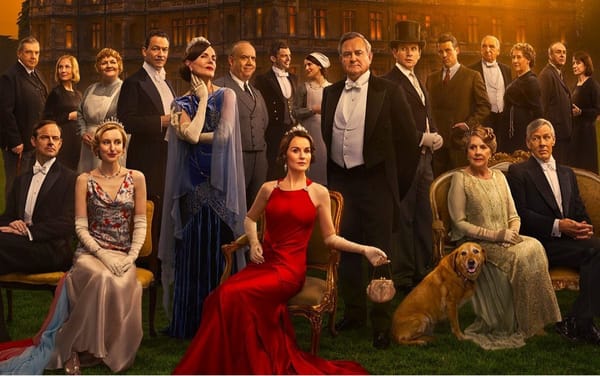★★★½ (3½ out of 4)
And a grand time is had by all at “Downton Abbey: The Grand Finale,” the third and final film (so they say) in a franchise that grew out of six delicious TV seasons, starting in 2011, that won 15 Primetime Emmy Awards and all of our hearts. “Downton” had me at hello. Now it’s goodbye. And I’m not happy about it. Others will keep hating on “Downton” for what they perceive as craven worship of a ruling class in which servants (read common folks) happily cater to every clueless whim from a family of rich, white, conservative, monarchy-worshipping Brits.
As “The Grand Finale” opens today in theaters nationwide, you may find yourself torn between both views. Fair enough.
The world of 'Downton,' admittedly as fantastical as Camelot, still celebrates an ideal of civility that is totally foreign for today’s tech bros and one-percenters.
Elegantly directed by Simon Curtis from a deeply felt screenplay by series creator Julian Fellowes, the film I think we all can agree is a triumphant swan song for its marvelous cast, sadly minus the great Maggie Smith, who died a year ago this month. Dame Maggie claimed she never watched the show in which she stole every scene as the Dowager Countess of Grantham, whose rapier wit skewered hypocrites, rich and poor alike. She missed a lot by not watching, but the finale pays proper tribute to her internal fire and mischievous spirit.

The film opens in 1930 with Downton in crisis. Lady Mary Crawley, played with her customary spiky, sexy assurance by Michelle Dockery, is feeling the hot breath of scandal for the unforgivable sin of —wait for it— divorce, an earth-shattering event upstairs and downstairs.
Oh, the horror when Lady Mary and her parents, Lord Grantham (Hugh Bonneville) and his American wife Cora (Elizabeth McGovern), are given the heave-ho by a snooty society hostess (Joely Richardson). Back then, a divorced woman was a social pariah (see “The Gilded Age,” another series from the prolific Fellowes, where the same plight befalls poor Kelli O’Hara). Luckily, Lady Mary finds an ally in bon vivant playwright Noel Coward, acted with smashing award-worthy panache by Arty Froushan, whose deadpan barbs rival Dame Maggie’s.
Another Crawley problem, besides social disgrace, is —gulp— complete financial ruin. Cora’s brother Harold (the great Paul Giamatti) arrives from the States with news that bad investments, guided by financial adviser Gus Sambrook (Alessandro Nivola, sleazy, seductive perfection), have resulted in the loss of the family fortune that has kept Downton going.
All seems lost with the Abbey on the chopping block. But it doesn’t stop frisky Lady Mary —the heir apparent— from indulging in a fling with the unscrupulous Gus that almost rivals her one-nighter with Turkish diplomat Pamuk (Theo James), who died from exertions in her bed in Season 1. Despite their formal wear, those Crawleys know how to let loose in private.
There’s no less drama below stairs. Carson (the steady, sensational Jim Carter) is not going gently into retirement. And leave it to the dowager’s friend Isobel (divine Penelope Wilton) to invite two servants, Carson and cook Daisy (Sophie McShera), onto the board of the Country Fair, which drives elitist prig Sir Hector (the illustrious Simon Russell Beale) to near madness.
As for Lady Mary, her shrewd sister Edith (Laura Carmichael) contrives a society event in her honor to be attended by Noel Coward and his movie star friend Guy Dexter (the ever-dashing Dominic West). No one knows of Guy’s secret affair with former “Downton” servant Thomas (Robert James-Collier), so the coast is clear to break a few rules, such as the foolish ban on divorced women. When the chance comes for the elite to hobnob with glittering celebrity, they seize it. How times have not changed.
But in other ways they have. And the creators of “The Grand Finale,” which stops short of embracing the future, still sees it clearly from the present perspective of racial violence, class warfare, threatened women’s rights, Putin’s war in the Ukraine, Trump’s authoritarianism and the continued rise of blatant vulgarity. The allure of the past hold fast in this final chapter of the “Downton” trilogy, but as an escape, not a solution.
The world of “Downton,” admittedly as fantastical as Camelot, still celebrates an ideal of civility that is totally foreign for today’s tech bros and one-percenters. It’s that ideal that Lord Grantham honors as his fingertips touch the stone memorial to his mother near the film’s end. And we honor the cast and crew of this cinema remembrance for the pleasure of their company and the joy they take in recreating that one brief, shining moment.

